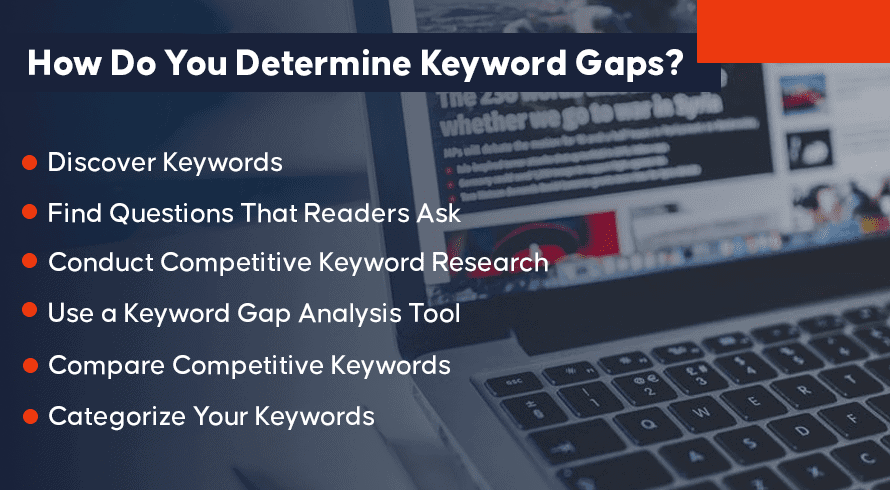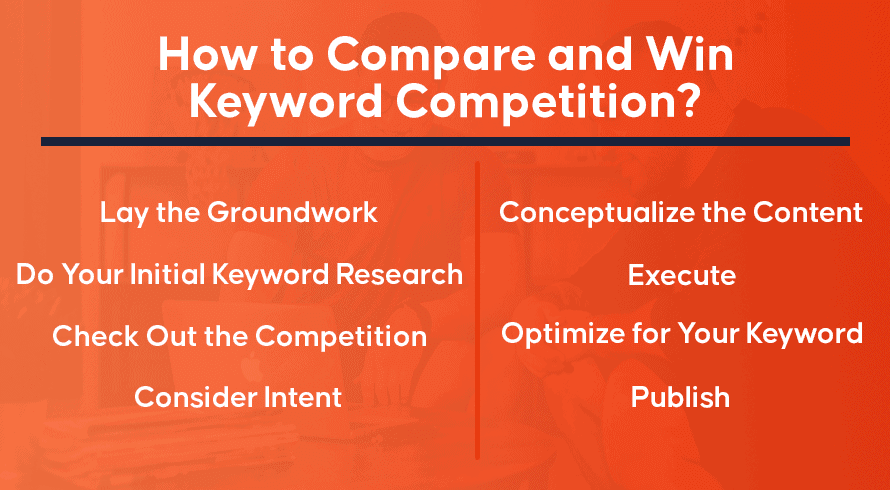Inquivix HQ
1-903, 18 Eonju-ro 146-gil,
Gangnam-gu, Seoul, Korea
06057

In today’s digital market, having a valuable online presence is important. Content marketing is one of the most popular methods to establish a business’s rank on search engines. As you continue to build your website and fill it with valuable content, you’ll want to be sure that you’re targeting the right keywords. But how can you tell if you’re targeting the right ones? One way to measure this is by identifying keyword gaps with your competitors.
What Is a Keyword Gap?
A “keyword gap” is a term used to determine how strong your website is in comparison to your competitors. The higher the number, the stronger you appear relative to your competitor(s).
Let’s say that you visit an SEO tool and put a competitor’s URL into the filter box. This will pull up information about their keywords and how much they’re spending on ads for those keywords. It will also tell you how many keywords they have found so far, as well as how many others are using Adwords or other forms of advertising such as social media or eCommerce stores. This data will come under three sections – Keyword, Search Volume, and Competition.

The “keyword gap” is the number of keywords your site has in common with your competitor, minus the number of keywords your competitor has in common with you. This gap is important because it shows you how many keywords you are missing from your competitor’s list. Keyword gap analysis helps you to determine your keyword rankings with a competitive gap analysis. Knowing what’s lacking in your existing content gives you valuable keyword opportunities.
How Do You Determine Keyword Gaps?
There are several different ways to do a keyword gap analysis. You can compare two websites side by side, or you can compare one site against all of its competitor websites at once.
Discover Keywords
One of the most popular ways to use the keyword gap analysis is to find keywords that you may not have considered before. This can be done by comparing your website to a competitor’s website. Keyword gap analysis helps you to devise a sound keyword strategy. This will help you to find keywords that your target audience is looking for.
Focused on Products and Services
The keywords you use have to be connected to the products and services you produce. They should tell your audience about how you stand out from your competitors and other value additions you provide.
Long Tail Keywords
This type of analysis can also help you find long-tail keywords that you may not have considered before. Long-tail keywords are phrases that are 3 or more words in length, and they tend to have much lower search volumes than shorter keyword phrases. However, they are often much easier to rank for, and they can be a great source of traffic.
Find Questions That Readers Ask
Another way to use the keyword gap tool is to find questions that readers ask. This will provide you with a set of keywords that users are actually looking for. It will also tell you whether there is an answer to that question or not. This content gap analysis will help you to plan a better content strategy for the next step of your site.

Conduct Competitive Keyword Research
There is a good chance that your competitors have already done their keyword research. Do a simple Google search for your seed keywords to learn who appears on the first page. A single competitor website can provide you with good keyword opportunities for your new content.
Use a Keyword Gap Analysis Tool
With the quickly changing content landscape, using SEO tools is needed to be on top of everything. It’s true for keyword gap analysis too. Using a properly equipped keyword gap analysis tool will be a huge advantage to improve your content.
Compare Competitive Keywords
Another way to use the keyword gap analysis is to compare competitive keywords. This can be done by comparing your website to a competitor’s website. Think about these aspects of your keyword strategy.
- What do you target that competitors don’t and vice versa?
- How differently do they target?
- How many keywords are targeted and what kind of content is created?
Categorize Your Keywords
For a more effective keyword gap analysis, categorize and filter your keywords. Use as many categories as you need for the best competitive keywords. If you find keywords that don’t belong in any specific category, either those are the biggest keyword opportunities to rank for or are the least relevant to your niche.
How Do You Analyze Competitors’ Keywords?

There are a number of ways to analyze competitor keywords depending on your business goals. One of the best ways to analyze your competitor’s keywords is to use the Keyword Gap Analysis tool. The keyword gap analysis tool allows you to compare websites and their keywords. It will show you how many keywords your competitor is using that you are not.
Once you have entered all of the websites, the tool can organize the keywords into sections such as opportunities, targeting, and competition. They would show you how many opportunities there are for ranking in search engines using the specific keywords or phrases entered, how many times a search engine has targeted the words on your list and how they did it, and how competitive the specific keywords are to rank for in search engines.
How to Compare and Win Keyword Competition?
The following are some guidelines for comparing keywords between your competitors.
Lay the Groundwork
The first thing you need to do is create your list of competitors. This should include at least five websites that are direct competitors for ranking in search engines. If possible, try to find keywords that are used by similar businesses or small businesses to yours.
Do Your Initial Keyword Research
The next thing you need to do is research which keywords your competitors are targeting. You can use any free keyword tool online. Once you have generated a list of the keywords your competitors are using, go through them and eliminate common words that are not relevant to you.
Check Out the Competition
Once you have your list of keywords, run a Google search for each keyword individually to find out what websites rank in the top five. You can also see which website is at the very top by searching for the specific keyword. After you have found the websites that rank at the top five for your list of keywords, go through and make a list of which words they are targeting. Make note if they use any direct competitors’ names on their website

Consider Intent
When you are considering your competitor’s keywords, it is important to think about the intent of the searcher.
Conceptualize the Content
Now that you have your list of keywords, it is time to start thinking about content. When you are conceptualizing your content, think about how you can use the keywords in a way that will be interesting and valuable to your audience.
Execute
Executing your content can be done in a number of different ways. You could write an article, create a video, or make a podcast to share on YouTube or your website. The most important thing you should think about is how it will benefit your audience.
Optimize for Your Keyword
After you have executed your content, it is time to optimize it for your keyword. Because Google changes its algorithm often, one thing that can help boost the success of your website within search engines is writing great content that gets shared on social media websites like Facebook, Twitter, or LinkedIn by a large audience. Sharing your content on a regular basis can help increase your organic traffic and boost your rankings in search engines.
Publish
Once you have optimized your keyword, it is time to publish it onto your website or another platform where people will read it. After publishing it, be sure to share it on social media websites and encourage people to read it. Identifying the Keyword gaps is an important step in online marketing. You can use this information to improve your website’s visibility and rank in search engines.
Conclusion
Keyword gap analysis is a key step in your content strategy. It can be a long tedious process but a necessary one. You can use the information you learn to create content that is interesting and valuable to your audience. Finally, be sure to publish your content and share it on social media platforms for the best results.
